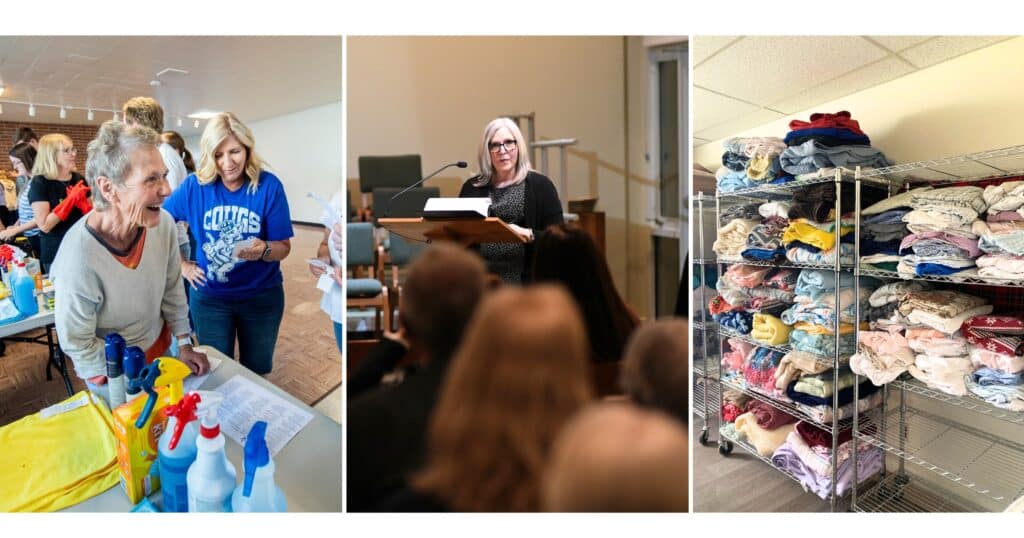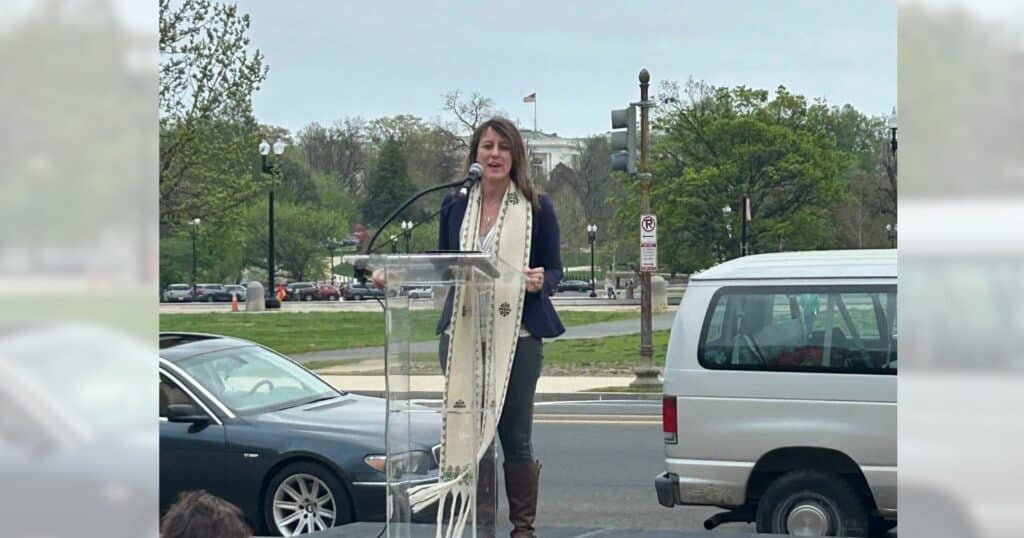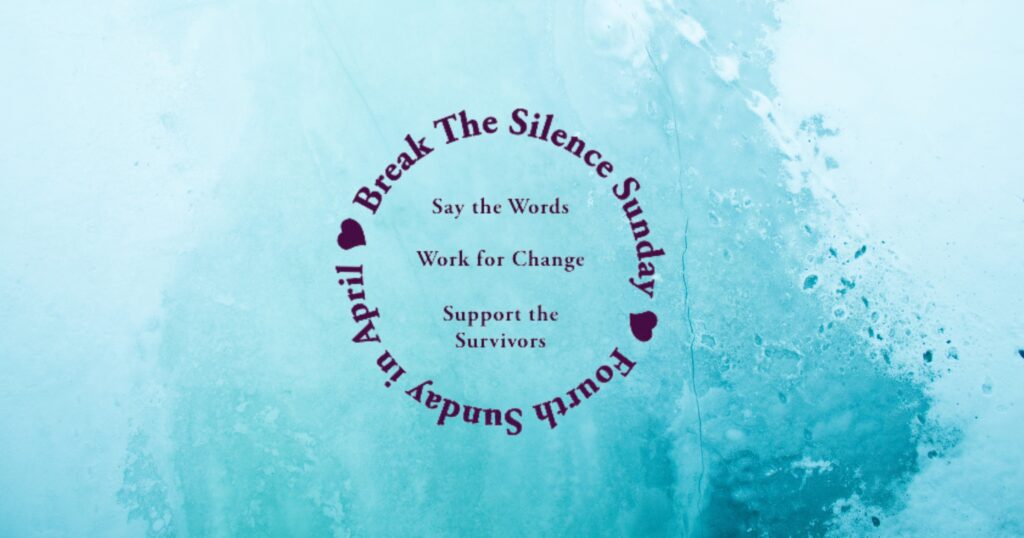Churches respond to housing crisis with shelter, advocacy, care
For people who are unhoused, winter can be a particularly difficult time – especially with the United States in the midst of a serious housing crisis.
Last year, a 12% increase in the amount of people experiencing homelessness included a sharp rise of those who became unhoused for the first time. The cost of owning or renting a home has skyrocketed, with no state having an adequate supply of affordable rental housing for the lowest income renters. And the Supreme Court will soon hear its first case on homelessness in 40 years which will consider the legality of fining or arresting people for sleeping outside – a case that could impact the already limited possibilities for those who are unhoused.
“Housing is one of our most fundamental human rights,” said Rev. Seth Wispelwey, minister for economic justice. “The ability to say one has a reliable home for rest is a core dream of God’s desire for humanity’s thriving. It’s beyond alarming, then, that these most basic necessities are not only falling away for millions, but are increasingly and actively under attack in the U.S.”
While some local governments have brought legislation to address the growing need, many churches have stepped forward to offer vital space, respond to needs, and advocate for increased affordable housing in their communities.
Warming space in Utah
One such church is Provo Community Congregational UCC in Provo, Utah. They have been using the church fellowship hall as a warming center for the first time.
When the temperature has dropped to 15 degrees Fahrenheit this winter, the church – in rotation with a few other faith communities – hosted around 30 people overnight as a low-barrier shelter space, meaning that any adult can come in with few exceptions related to safety.
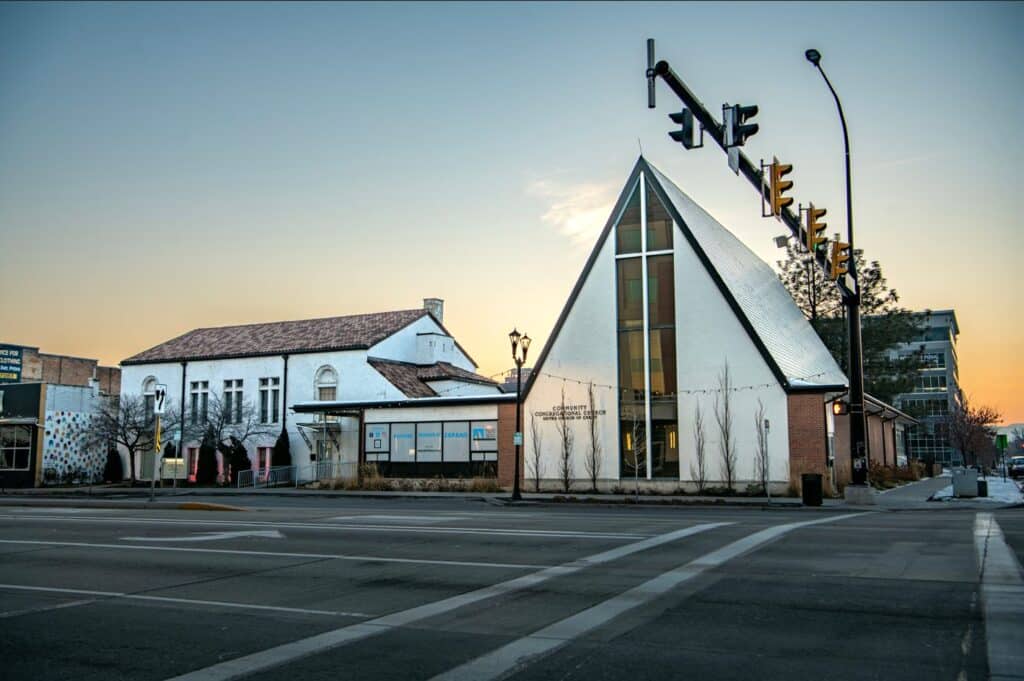
This is only possible because of a new law that allows for any public building – including a church – to provide shelter on these designated “Code Blue Nights.” By next winter, the law requires a warm shelter available every winter night.
Kena Mathews, who serves both on the church council and as housing director at Community Action Services and Food Bank, initially proposed that the church become a warming center. Because of their downtown location, the church tends to receive people who are homeless at services and during the week looking for help. Mathews helped arrange logistics, and a grant from her work covered food and additional costs, as well as providing team leaders and volunteers.
Mathews, who has a long history of working in housing and homeless response, recalls the heartbreaking instance of an unhoused person she befriended 23 years ago, dying of exposure in an abandoned car, one of tens of thousands of people who die each year due to dangerous conditions that accompany living without housing.
The church warming center opened on the anniversary of his death.
“He might be alive today if we had something like this available,” Mathews said. “I cried the first night we were open. The political will is not always there, the community is not always there, but the church’s will was there. If you can provide a roof over someone’s head, they can become stable. In Christian community, we should not be allowing people to die on the street.”
Mathews has spent several nights in the church’s warming center, comforted that for 12 hours, people who are tired and hungry have a safe place to rest.
“For churches across the country, homelessness is a huge problem, and it takes everyone,” she said. “We really need to work together to solve this problem, and churches can be part of that in an effective way, but we all need to come to the table to address what we can. We are fellow children of God, and we all deserve to be loved.”
Maine shelter an ‘extension of faith’
This is the second winter that South Parish Congregational Church UCC in Augusta, Maine, has run a 30-bed, low barrier warming center that is open every night during the winter, offering beds, warm drinks, microwave meals, and a common space to gather and watch tv.
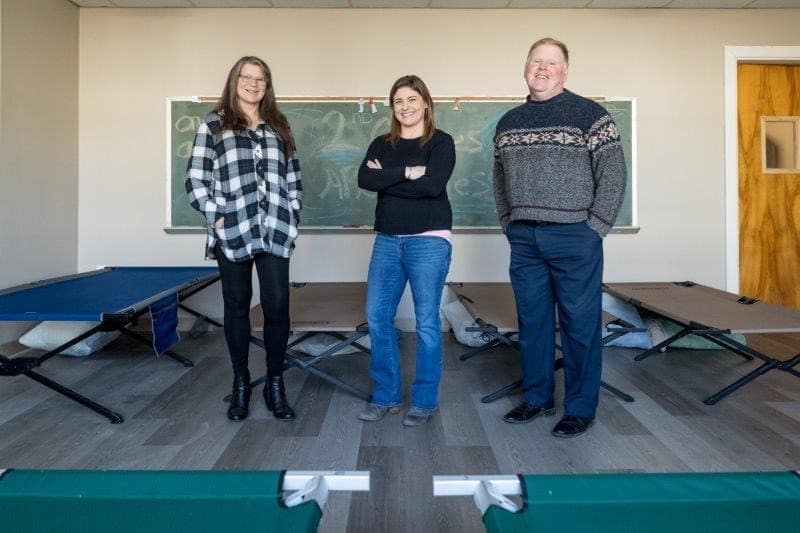
When the Rev. Nathan Richard became the pastor four years ago, one of his goals became to make better use of the massive space available in the building. In addition to hosting support groups, a bridge club, and a preschool, over time the church developed its downstairs wing into the Augusta Emergency Overnight Warming Center with help from American Rescue Plan funds in 2022.
The center, which employs a full staff, is full to capacity nearly every night in an area facing increased housing needs.
“We showed the community and town government that it’s working and helping,” Richard said. “The hope is they can offer funds to keep it going as a big asset and help to the community for getting people off the street.”
Julia Stone, who serves as director for the warming center, says they have exceeded the main goal “to keep people alive” and safe during the harsh Maine winters. She’s also proud to have a staff that builds supportive relationships with those who stay there. “It’s a beautiful thing to watch,” she said.
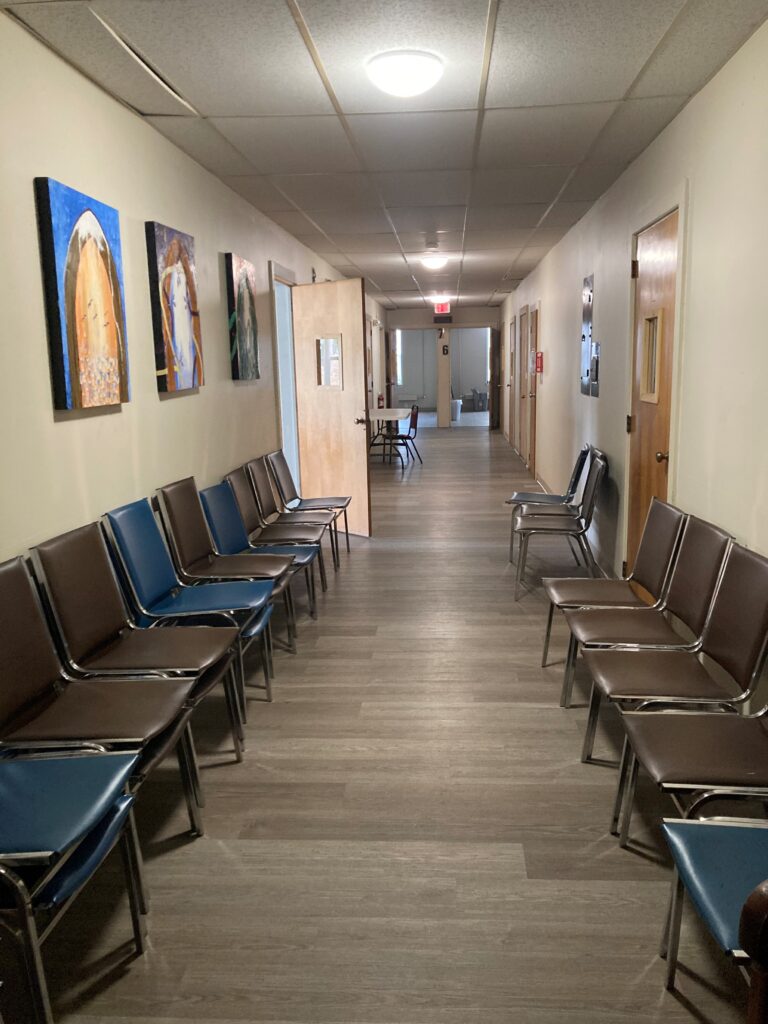
One person who stayed at the warming center shared that it offered a place to recover after suffering from a heart attack. Others noted the importance of finding the space while facing mental health conditions, addiction, domestic disputes, and lack of food. More than anything, people shared how it offered a warm place to stay when they needed it most and kept them out of the cold.
Richard describes this church effort as “an extension of our faith.”
“We have an understanding of helping those in need and those considered less-than in society and giving them a place to stay warm. It’s now a community building, which is what church is supposed to be, and it’s using space that was not being used at this great big building in the center of town,” he said. “It was rough at the beginning, but it has become a pivotal point of strengthening faith where people were willing to try this. The result is a healthy sense of pride in the people who worship here. We’re doing what Jesus asked us to do and the best that we can.”
The two leaders offered recommendations for other churches considering doing something similar.
Find the experts, Richard says, explaining how an advisory committee of people working in social services was created to lead the process. He also advises developing a clear and specific mission that isn’t too big. For them, that meant limiting operations to winter nights – a level they could maintain well.
Stone described the helpfulness of reaching out to other area warming centers to develop best practices and build area resources and connections.
While the warming center operates with its own staff, church members have been essential for overseeing renovations to improve the space, offering contractor recommendations, and helping with the food pantry, Stone said.
Organizing greater Boston for housing justice
Aside from offering building space, there are many opportunities for faith communities to get involved in advocacy for affordable housing in their communities.
United Church of Christ Norwell in Norwell, Massachusetts, recently hosted a public meeting focused on housing justice as a member of the Greater Boston Interfaith Organization. It was streamed live through social media and on local broadcasting.
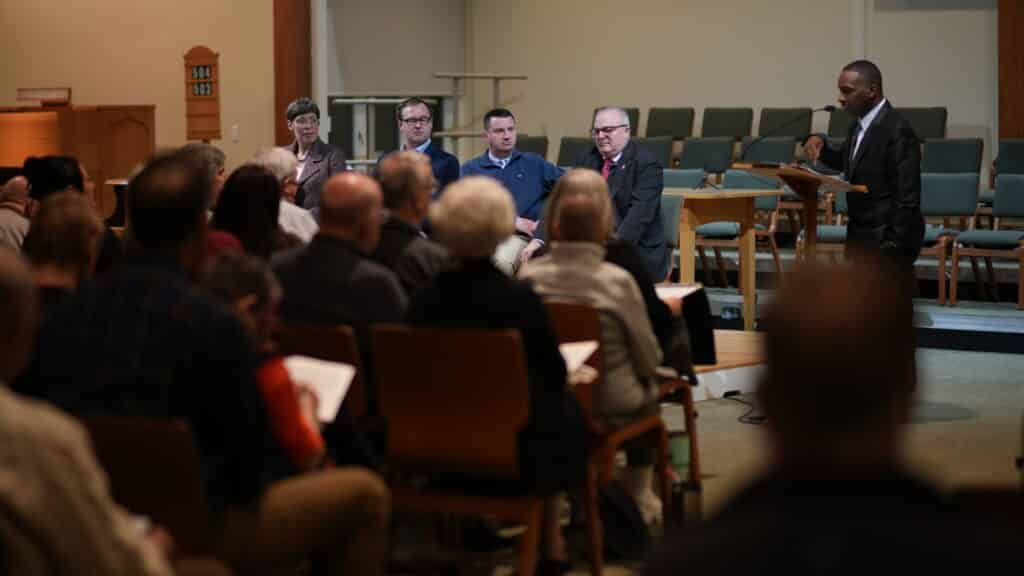
They joined GBIO to get more involved in organizing work in their community, said Susan Domey-Allen, a member of UCC Norwell’s racial justice ministry team. The group was inspired by GBIO’s focus on pressing issues that emerge from directly surveying communities in the greater Boston area.
This year’s advocacy focus: the need for affordable housing. The organization has a particular goal of addressing racial and class disparities in the housing market.
After engaging in racial justice study, congregant Margaret Clapp said several from the church initially got involved by attending a GBIO meeting and beginning to learn about the complexities surrounding the housing crisis.
The church launched right into the work, hosting a Feb. 8 event featuring four local state legislators who responded to questions about housing affordability, the Affordable Homes Act – a proposed Massachusetts bond bill that would put $4 billion towards affordable housing infrastructure – and bills that offer housing vouchers and state ID assistance for formerly incarcerated people. The event included personal stories shared by people who lost their homes and struggled to find affordable housing.
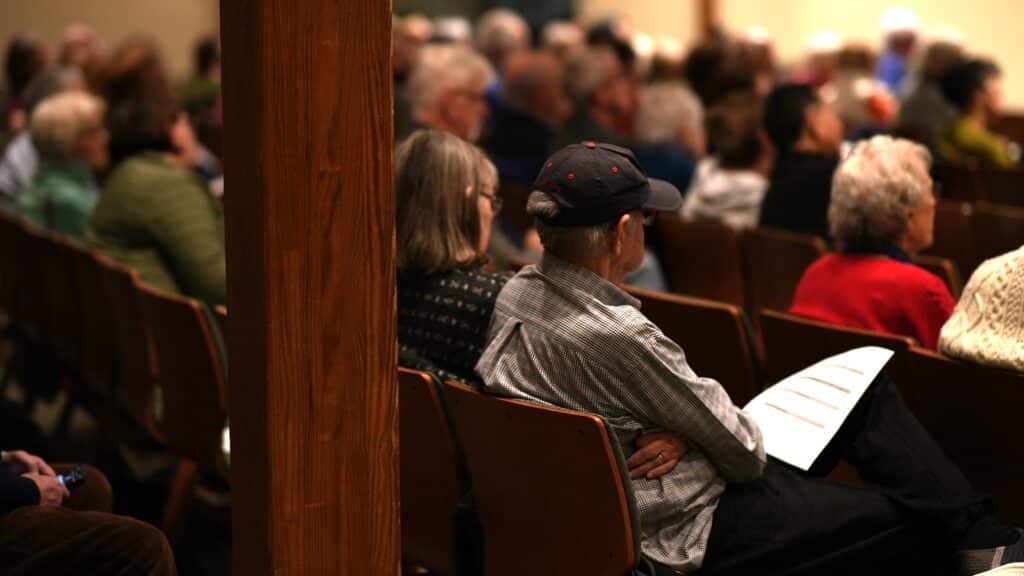
Domey-Allen described the importance of staying committed and invested in the ongoing initiative.
“It’s not like a one-time thing. We started something, and we have to follow it through until the legislative votes. We have umpteen more actions to push this agenda forward. I got involved in this work because I know a lot of people who need housing,” she said.
“My faith calls me to do this,” Clapp said. “When somebody in the community is suffering, the community is suffering, and our obligation is to work on behalf of others and make sure what I share is to lift others up. For me the social gospel is ringing through this.”
Housing as a human right
The UCC General Synod has a long history of support for housing justice.
A 2013 General Synod resolution promoted advocating for funding to construct quality affordable housing, and a 1973 adopted statement affirmed the right of all citizens to decent housing conditions “as a matter of moral responsibility implicit in the Christian faith.”
People are invited to submit the current action alert urging Congress to pass the Affordable Housing Credit Improvement Act that would provide more affordable housing for those most in need.
In a recent webinar, “No Room at the Inn, Praying Through the Housing Crisis,” UCC leaders discussed the current housing crisis in relation to the Christmas story.
The Rev. Jennifer Butler, pastor at First Congregational UCC in Corvallis, Oregon, shared how her congregation became involved in offering transitional housing through tiny homes on their property.
“For most of the folks I work with now who have been living outside for decades, the roof is important, the locking door is important, but even more important is being recognized as human and having a space to be seen and to be held in the tenderness of belonging. And that I think is what is salvific – restoring one another to humanness,” she said. “If the church’s relationship with the folks who are living across our driveway has been healing for them, it has been more healing for us. It has restored our sense of what it means to be a human.”
Wispelwey encourages local churches like these to step in and use their resources to respond to their community’s housing needs:
“I’m grateful for the churches finding and putting themselves on the front lines of response to this intentional crisis, and implore us all to advocate, show up, and use our bountiful resources of space, funds, and community connections to ensure those in our community know a stable place of extravagant welcome – of home.”
Content on ucc.org is copyrighted by the National Setting of the United Church of Christ and may be only shared according to the guidelines outlined here.
Related News
Churches for Middle East Peace marks 40th anniversary: Words and deeds prevail at advocacy summit
Churches for Middle East Peace (CMEP), a coalition of more than 30 national churches and...
Read MoreUCC Stewardship materials now available
The new United Church of Christ stewardship materials are now available from UCC Resources to...
Read MoreApril 28 is Break the Silence Sunday: Congregations join in supporting survivors of sexual assault
This news piece features discussion of sexual assault. When the Rev. Moira Finley set up...
Read More